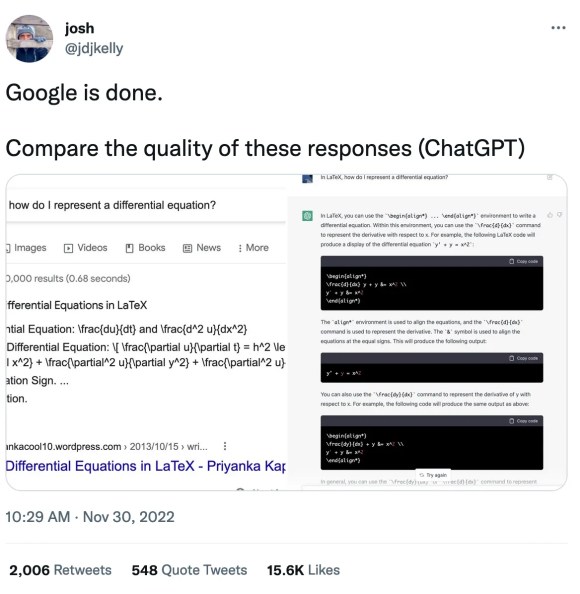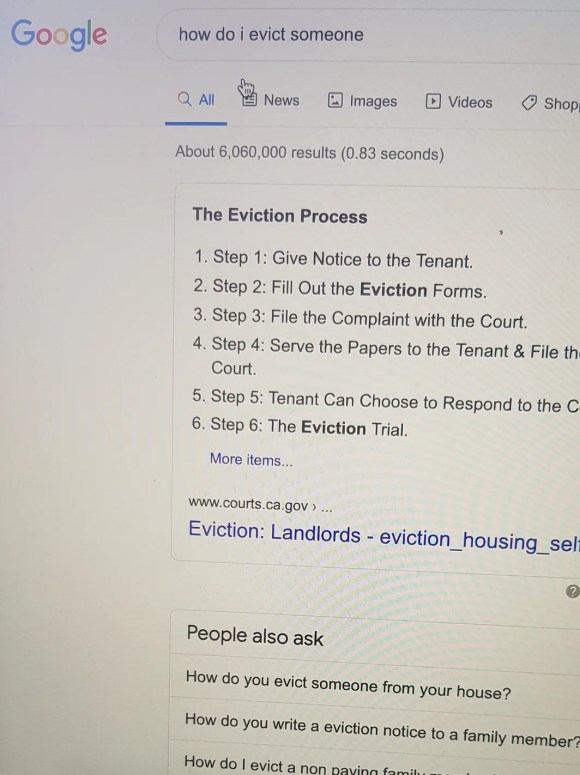Nóra Al Haider
For those of you who have missed the news, OpenAI trained a model (ChatGPT) that answers queries in a conversational manner: it responds to follow-up questions, corrects mistakes and challenges/rejects inappropriate requests.
Is AI Chat the New Google Search?
I found people raving about this new chat model. One particular tweet really stood out me:

ChatGPT seems like such an amazing new way to search for information online. I was eager to test it out for myself, in particular for one of my favorite research interests: online legal information.
What would AI Chat Mean for Legal Help Info?
As you all know by now, one of our aims at the Lab is to connect users to jurisdiction and legal issue-specific information that is up-to-date and freely accessible (so not hidden behind paywalls). We are working towards a reality where Google and other search engines provide snippets and legal knowledge panels, similar to what they do with health knowledge panels. As most people search for legal information online, providing users with jurisdiction and issue-specific information would ensure that we increase legal capability, access to justice and that we empower users during their legal journey.

Legal Search Results Are Often Low Quality
Compared to that vision of a clear, authoritative search results page, we are still not there.
The top results on search engine result pages are not jurisdiction-specific. They direct users to websites with most of their relevant content behind paywalls. Or, most often, search engines send people to websites with content-farmed generic information that is technically ‘correct’ but not actionable. These generic short articles don’t provide the user with good quality legal information that they need to proceed in their legal journey.
In the worst-case scenario, search engine results can be outright misleading. Take this results page for a free counsel query, that’s searching for a free lawyer for an eviction lawsuit.

A person facing eviction in San Francisco is guaranteed a free lawyer under the new “Right to Counsel” as of Summer 2019. But a Google Search for “free lawyer for eviction SF” directs them to a Knowledge panel from a commercial law firm.
What do search engines show to landlords versus tenants?
I have also recently observed that there is not an equal playing field when it comes to search queries from tenants and landlords.


Compare these two images and queries. One is from the perspective of a tenant, looking for information about eviction. It has no snippets or knowledge panels and the second and third result on the page are websites with generic information. The other image is a query from the perspective of a landlord. The landlord receives a legal snippet from the California Court’s website.
These user-friendly snippets should be available for all parties to ensure there is an equal playing field. Why is the search engine showing a clear checklist to one party, but not another?
So far, I have not heard a single argument why this could not be possible.
Can AI Chat do better than Google Search?
You can therefore understand my excitement when I saw the ChatGPT results. What would happen if I asked the chat model my usual eviction queries?

The information provided by ChatGPT is correct. I also applaud the plain language. Unfortunately, the information is too generic to really increase legal capability and empower users on their legal journey. So let’s see what happens when I ask a follow-up question:


Although the bullet point list is excellent and easy to digest, the information that is provided is too generic to really make a user understand the next steps.
Obviously, at this point, I did not input a jurisdiction in my query. Most users would not mention their location in a query and I was secretly hoping that ChatGPT would prompt me to do so. It did not and I definitely think there is more ground to be gained on this front.

Again, the information is not wrong, but I was just fervently hoping that ChatGPT would actually mention my rights as a tenant in Palo Alto.
I was also curious to see if there would be differences in how queries from landlords would be treated, so I tried out some queries.


My first query was without and the follow-up question was with a location. Queries without location are too generic to be truly useful for users searching for online legal information. The queries with location for landlords are slightly less generic than for tenants. Again, I wonder where this discrepancy stems from? Both tenants as well as landlords need access to good quality legal information. There needs to be an equal playing field for both parties.
ChatGPT could gain so much ground by delving into the world of legal information. Even small tweaks such as prompting users to input their location if they ask a legal query would already be a massive win. It would push access to justice into another realm if, in the future, we could have ChatGPT walk users through the process of their legal query and provide specific, high-quality legal information.
There is a High-Quality Supply of Legal Info Online. It’s Just not being shown by platforms.
Jurisdiction and legal issue-specific, high-quality legal information already exists online. Courts, legal aid organizations, and others have been working tirelessly to create content for users with a legal query.
Unfortunately, these pages cannot compete with commercial websites in search engine page rankings. This is a huge loss for everyone involved, from the legal community to the tech companies.
Search engine pages are the starting point of people’s legal journeys. Millions of people use the Internet before they consult legal professionals. If search engine pages make the first step on this legal journey haphazard or outright dangerous in case of misleading information, it not only affects an individual’s legal journey but also erodes trust in the legal system in the long-term.
Legal Help Groups Need To Work with Online Platforms
Legal professionals, researchers, and tech companies need to actively work together to make sure everyone can access good quality online legal information. Please do not hesitate to reach out if you want to collaborate on this topic:
P.S. What About the Legal Images?
By the way, as for DALL-E (the AI image generator), I had hoped that DALL-E would be a way for legal aid organizations and courts to stop using stock images.
User research indicates that stock images come across as impersonal, especially when one is searching for information about stressful and traumatic legal issues.
At the Lab we always advise organizations to put time and effort into creating customized imagery. After playing around with DALL-E and eviction-related keywords, I’m going to hold off on that recommendation for the time being, as I do not think that melting AI faces would help make legal information websites feel more welcoming.


